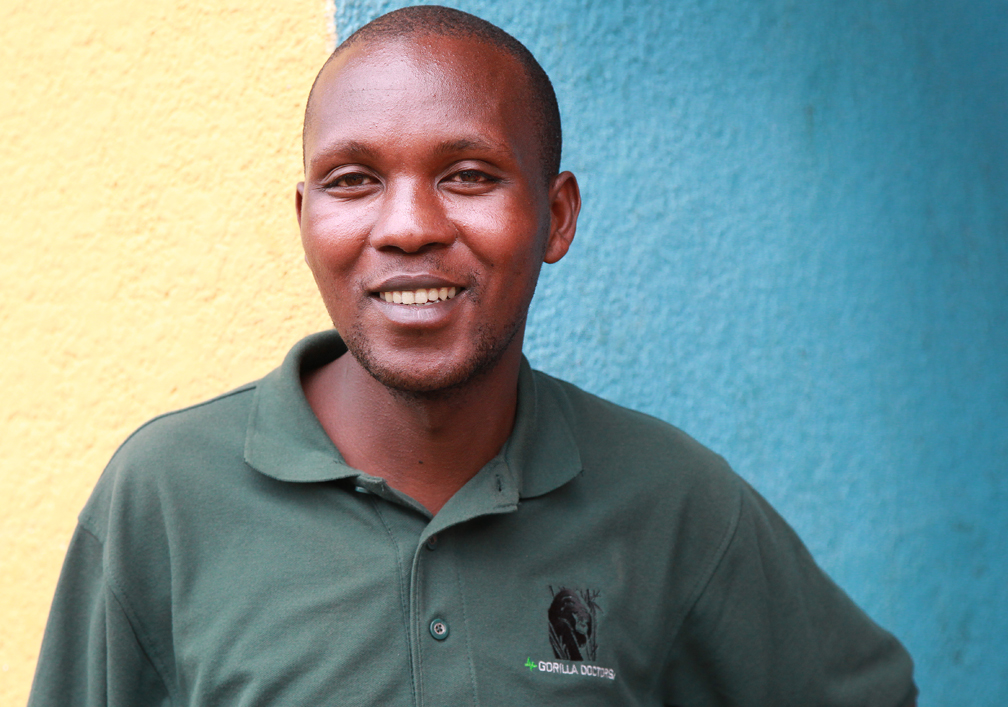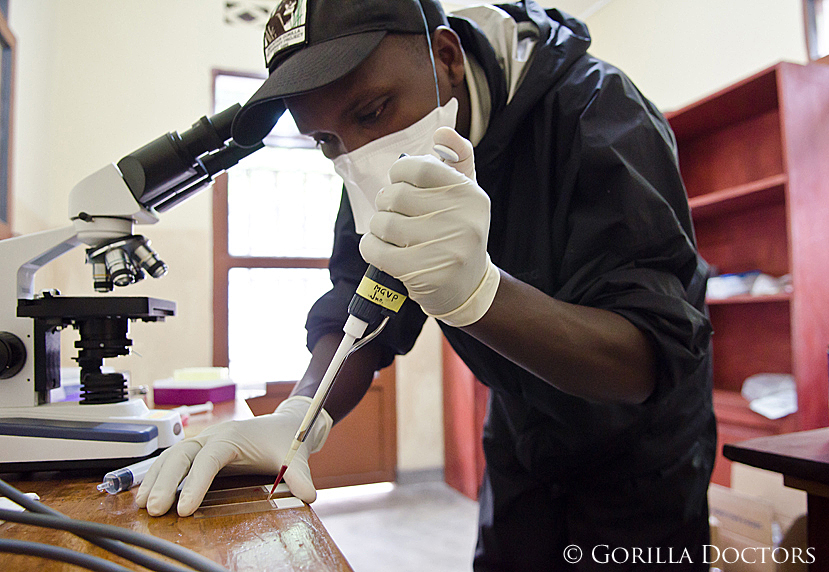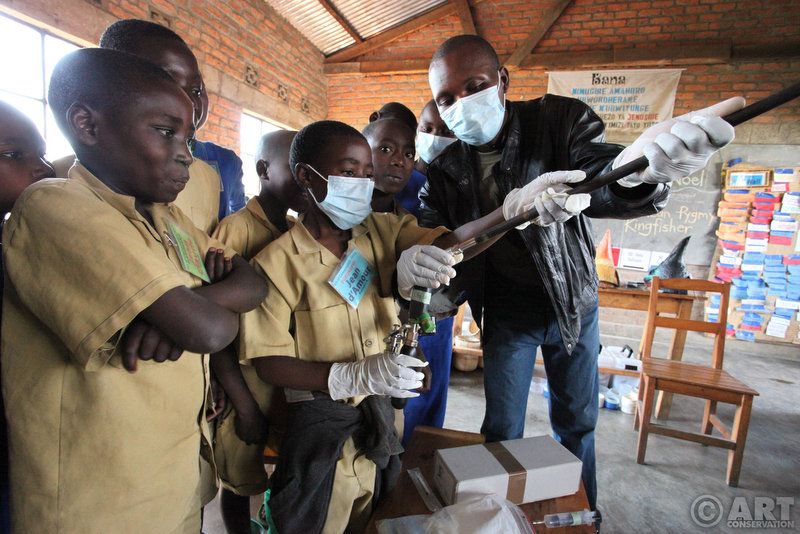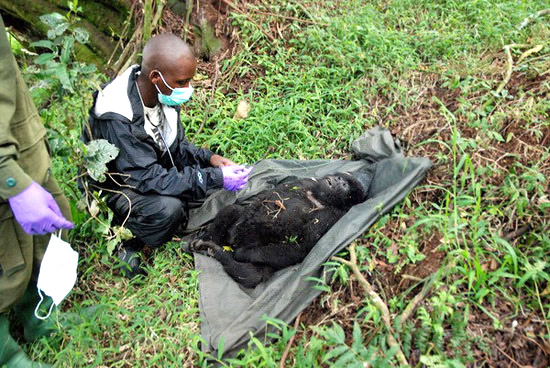Spotlight on Dr. Noel, Rwanda Field Veterinarian
By Gorilla Doctors Staff on Monday, October 13th, 2014 in Blog.Dr. Jean Bosco Noheli, better known by his colleagues as Dr. Noel, appreciates every day he spends as a Field Veterinarian with the Gorilla Doctors in Rwanda. “This is a commitment. Our work is motivating. When you do it, you are always proud. It’s something that makes you happy every day.” Everyday is a new challenge for 34-year old Dr. Noel, who says he is constantly learning from the mountain gorilla groups throughout Volcanoes National Park.
 Dr. Jean Bosco Noheri, better known as Dr. Noel.
Dr. Jean Bosco Noheri, better known as Dr. Noel.
Dr. Noel, now in his 5th year with Gorilla Doctors, is walking proof of the power of perseverance and dedication: getting to where he’s at today was not so easy, he says. “After the genocide, the country was building up everything from zero. They created a veterinary school. When I was in my 4th year, I applied for an internship with Gorilla Doctors.” However, Dr. Noel was not accepted at that time. “In my 5th year I tried again, but I wasn’t accepted either. In my final year at veterinary school, I worked in a laboratory analyzing fecal samples from cows and when I was nearing graduation, a position became available with Gorilla Doctors – the Regional Laboratory Manager… I applied and got it!”
He spent 3 years working in the lab in the Gorilla Doctors Regional Headquarters, analyzing gorilla and other wildlife specimens and assisting in necropsies on deceased animals to learn more about disease and the cause of death in mountain gorillas.
 Dr. Noel working in the lab in Musanze.
Dr. Noel working in the lab in Musanze.
In 2012, Dr. Noel was promoted to Field Veterinarian, a moment he had waited for a lifetime. “In my very young age, I used to hear Dian Fossey on the radio, how passionate she was. That was motivation.”
Dr. Noel says he and the staff at Gorilla Doctors take every precaution when they are in the field for a medical intervention or conducting routine health checks of the gorilla groups by wearing protective clothing and masks. However, with locals entering the park, the health hazards and risk of disease transmission increase.
“In the dry season in the area bordering the park, kids will be go into the forest to look for water. When they are there, they can urinate and defecate, which can expose gorillas to disease.” Even a human’s common cold can be very hazardous to the gorillas. “The rules say to stay 7 meters away. Human beings know that, but gorillas do not. Sometimes, they just come to you.”
The Gorilla Doctors spend time speaking with local school children about the plight of the mountain gorilla and the importance of safeguarding the environment in Rwanda. Dr. Noel makes periodic visits, particularly to the schools in close proximity to the national park, to talk about his work as a Gorilla Doctor and share his knowledge of wildlife health. He hopes to inspire the younger generation of Rwanda to become guardians of their country’s national treasure. And who knows, in one of those classrooms could be a future Gorilla Doctor!
 Dr. Noel shows school children the dart gun that is used to administer anesthesia to begin an intervention.
Dr. Noel shows school children the dart gun that is used to administer anesthesia to begin an intervention.
In addition to human colds and respiratory disease, the current Ebola epidemic in West Africa is another huge concern says Dr. Noel.
“There is a whole national and regional fight against the spread of Ebola. As people involved in this particular work, we are thinking: “how would we protect gorillas? how would we protect our people? Those involved in gorilla conservation are very much concerned.”
As a field veterinarian, Dr. Noel explains why every procedure must take place in the wild: “If you take an animal outside the park for care, there is zero chance to take the animal back in the group. Even if [the procedure] takes several hours, everything has to be done close to the group, immediately, and in the forest.”
 Dr. Noel administers medication to an infant mountain gorilla caught in a poacher’s snare.
Dr. Noel administers medication to an infant mountain gorilla caught in a poacher’s snare.
And ironically, it’s often easier to work on a 400 pound silverback mountain gorilla than it is a baby. “The silverback is big. It’s very easy to find the target if you’re shooting [a tranquilizer] dart. But if you are intervening for a sick or injured juvenile or an infant, the silverback is the one to protect his family… this is where you might be exposed to danger if you don’t pay attention and stay on your toes.”
But why go by Dr. Noel, if his name is Dr. Jean Bosco Noheri ? A simple explanation: “I was born on Christmas Day. Noel means Christmas in French. So it’s very short, Instead of saying Noheri, which is very hard for some people to pronounce.”
Dr. Noel remains optimistic about the future for the mountain gorilla population and the people who work to save them. “Our goal is to save every single gorilla. Every single life counts for us. The Gorilla Doctors team has grown bigger, so the outcome in the future can be bigger, both in gorilla conservation and wildlife medicine.”
—–
Watch Dr. Noel as he is interviewed for Australian television program “The Project” about his work with orphan Grauer’s gorilla Ihirwe:


 Donate
Donate